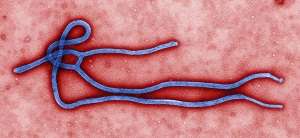 |
| Ebola virus under an electron microscope--Courtesy of CDC |
As the death toll from West Africa's Ebola outbreak hits nearly 540--a 60% mortality rate--drug development for the untreatable disease is lagging, largely due to lack of interest from Big Pharma and the relative infrequency of the disease.
Since its emergence in 1976, the Ebola virus has been connected to about 10,000 cases, a tiny potential market that adds up to little economic incentive for major drug companies.
The few therapies that are in development are still in the preclinical or early clinical stage, but some medical professionals are calling for the use of such experimental therapies in at-risk populations affected by the Ebola outbreak in countries like Guinea, Liberia, and Sierra Leone.
One of those investigational therapies, Tekmira Pharmaceuticals' ($TKMR) RNA interference therapeutic, has hit a regulatory snag. The RNAi therapeutic, dubbed TKM-Ebola, was recently placed on clinical hold by the FDA over safety concerns. The FDA granted a Fast Track Designation in March for its RNAi therapeutic, which works by "silencing" disease-causing genes, and earlier preclinical work published in The Lancet demonstrated that the therapy provided a 100% protection rate in monkeys given a lethal dose of the Ebola Zaire strain.
But for Tekmira to resume its Phase I trial, it will have to hand over additional data to the FDA related to cytokine release at higher doses. Cytokine release syndrome is a common complication that causes high fever and, in severe cases, buildup of fluid in the lungs.
The National Microbiology Laboratory in Winnipeg, Canada, the U.S. Army and two drug companies, Mapp Biopharmaceutical of San Diego and Toronto-based Defyrus, are working on an antibody cocktail, and Bloomberg reports that a safety trial could begin in the first half of next year. But that therapy could be years away from the market.
A few companies are testing Ebola vaccines--namely, Inovio Pharmaceuticals ($INO), Vaxart, and now GlaxoSmithKline ($GSK) with the recent acquisition of Swiss biotech Okairos, which has an Ebola vaccine. But those are all in preclinical testing.
Though investigational anti-Ebola drugs have yet to prove they can be safely and effectively tolerated in humans, medical organizations like The Wellcome Trust and Médecins Sans Frontières are advocating for the use of experimental therapies in humans. Other experts, however, are urging against using such drugs in humans until they can be tested in healthy volunteers first.
- get more from Bloomberg